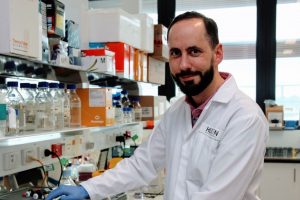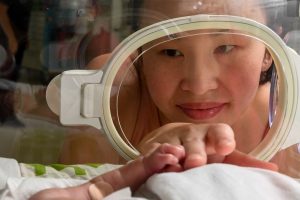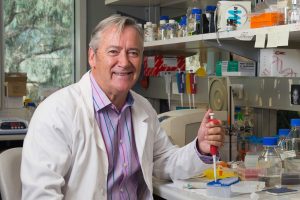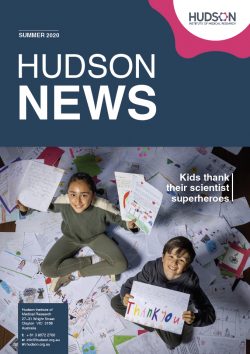As the second wave outbreak in Melbourne clearly showed, coronavirus is highly infectious and affects the most vulnerable in our society, particularly the elderly and those with pre-existing health conditions. COVID-19 can also leave healthy people with lingering debilitating symptoms. Without safe and successful treatments, the threat of SARS-CoV-2 infection is particularly foreboding, with implications not only for the most vulnerable, but potentially for all our loved ones – young and old.
As scientists around the world race to deliver a COVID-19 vaccine, Hudson Institute researchers are using their world-leading inflammation research expertise to develop treatments to mitigate the deadly inflammation caused by SARS-CoV-2.
Clinical trial starts in Europe

The first clinical trial of a potential COVID-19 treatment involving a discovery by Hudson Institute researchers received approval in September.
The end-stage prostate cancer drug Veyonda will be tested as a treatment in COVID-19 patients, following a discovery by Dr Michael Gantier and his team that the drug has potent anti-inflammatory activity.
The trial will involve approximately 40 patients in hospitals in Ukraine and Moldova, two countries experiencing high rates of SARS-CoV-2 infection and hospitalisation.
Placental cells to fight COVID
Associate Professor Rebecca Lim is exploring the use of placental cells (from the amniotic sac), which have potent anti-inflammatory and regenerative effects, to treat COVID-19.

A/Prof Lim has been investigating the use of these cells to treat a serious form of lung disease in extremely premature babies, called bronchopulmonary dysplasia, as well as liver disease and stroke.
A/Prof Lim and Professor Euan Wallace (Head, Monash University Department of Obstetrics and Gynaecology; Research Group Head, The Ritchie Centre, Hudson Institute) have begun a clinical trial to investigate whether these cells could also help treat patients with serious respiratory disease due to COVID-19.
The team is working closely with intensivists at Intensive Care Units from Monash Health, Austin Health and Western Health to deliver a Phase 1b/2a clinical trial for COVID-19 positive patients requiring ventilatory support.
Funders
Victorian Medical Research Acceleration Fund (amniotic exosome therapeutics to treat BPD in extremely premature babies, and potentially other respiratory conditions including COVID-19).
Medical Research Future Fund (stem cell therapies for liver disease).
COVID-19 immune response

Previously, we told you about a research project studying the innate – initial – immune response of COVID-19 patients admitted to Monash Health. We are pleased to report that this is now underway involving our world-leading innate immunity, microbiome and paediatric immunology researchers: Professor Paul Hertzog, Dr Sam Forster, Professor Marcel Nold and Associate Professor Claudia Nold. The study is comparing the status of the immune response and microbiome composition in COVID-19 positive patients of different ages, disease severity and outcomes; e.g. recovery or intensive care with samples processed in our newly upgraded clinical research lab.
Fundamental research like this, with your support, will help us to better understand the virus and how best to optimise our immune response to fight it.
Collaborators
Professor Paul Hertzog, Dr Sam Forster, Professor Marcel Nold, Associate Professor Claudia Nold, Professor Phil Bardin, Professor Jim Buttery and Dr Ben Rogers.
Funding
This project requires funding for analysis using hi-tech equipment and procedures.
COVID-19 facts
Australia
> 27 000 cases (20 000 in Victoria)
> 880 deaths
Globally
> 33 million cases
> 1 000 000 deaths
-
Previous
Director’s
message -
Next
COVID-19: Finding the right balance

